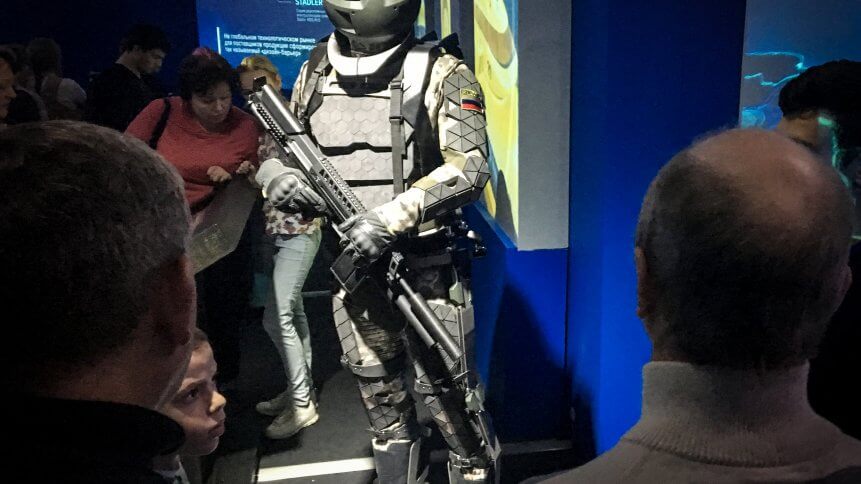


A prototype of a high-tech combat suit for the Russian army during an exhibition entitled “Russia focused on the future” at the Manege Hall in downtown Moscow back in 2017. (Photo by Mladen ANTONOV / AFP)
The United States hit a series of Russian technology firms with sanctions on the last day of March, including the nation’s largest chip maker, in the latest punitive move against Vladimir Putin’s “war machine.”
The US Treasury said the sanctions targeted Russian networks and technology companies that were “instrumental” to Russia’s invasion of Ukraine. Mikron, the largest Russian manufacturer and exporter of microelectronics, was among 21 entities and 13 individuals listed for penalties, including the blocking of any property in the United States.
“Russia not only continues to violate the sovereignty of Ukraine with its unprovoked aggression but also has escalated its attacks striking civilians and population centers,” said Treasury Secretary Janet Yellen.
“We will continue to target Putin’s war machine with sanctions from every angle, until this senseless war of choice is over,” she added. Also named were AO NII-Vektor, a software and communication technology firm, hardware sector company T-Platforms as well as Molecular Electronics Research Institute (MERI), which does work for the Russian government, the US Treasury said.
As a result of the sanctions, all US property of the targeted people and firms is blocked and must be reported to the US government. The penalties also take aim at Moscow-based OOO Serniya Engineering, which Treasury said is at the center of a network that seeks to evade sanctions by working to hide final users of “critical Western technology,” such as Russian intelligence and military agencies.
A series of people alleged to be working on behalf of Serniya were named in the sanctions. The Kremlin has scrambled to limit the effects on Russia’s economy of the unprecedented measures, which have affected everything from the central bank’s foreign reserves to McDonald’s.
But for the US and its allies, heavier sanctions are being imposed on Russia, which included export controls designed to cut the world’s largest nation by landmass off from semiconductors and other advanced technology crucial to the military, biotechnology, and aerospace industries. Other chipmaking countries that were also allied to the US such as Japan, Taiwan and South Korea, have either followed suit or indicated that they will.
“We’re going to impair their ability to compete in a high-tech 21st-century economy,” Biden declared last month as part of what the White House called “Remarks by President Biden on Russia’s Unprovoked and Unjustified Attack on Ukraine”. He emphasized that “between our actions and those of our Allies and partners, we estimate that we’ll cut off more than half of Russia’s high-tech imports.”
The US Commerce Department, through its Bureau of Industry and Security (BIS), announced “it will severely restrict Russia’s access to technologies and other items that it needs to sustain its aggressive military capabilities.” More specifically, BIS said the Russia-specific export control measures “impose a policy of denial on sensitive items Moscow relies on for its defense, aerospace, and maritime industries.
“These items, many of which were not previously subject to controls when destined for Russia, include semiconductors, computers, telecommunications, information security equipment, lasers, and sensors,” BIS noted. Then on Friday morning, the European Union reinforced its support to Ukraine, unveiling sweeping restrictions on technology exports to Russia.
Over one month into the invasion that first launched on February 24, Moscow has faced heavy military losses in exchange for relatively meager progress on the ground. But analysts say factors including the changing seasons and even an upcoming draft conscription intake could encourage Putin to press the operation for months to come.
© Agence France-Presse
20 June 2024